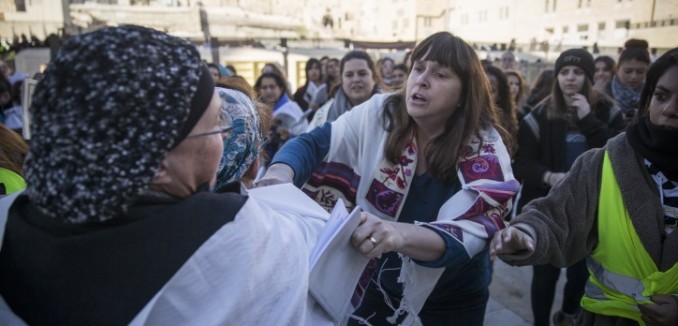Perched on a ledge outside the Church of the Holy Sepulchre in Jerusalem is an unremarkable wooden ladder, placed there by an unknown person, which has stood untouched for 150 years. The six Christian denominations that grudgingly share one of Christianity’s holiest sites are locked in a tense territorial standoff. Fistfights have been known to break out among the monks over the rights to worship in different halls of the church, and even over moving chairs from their designated spots. And so no one has dared move the ladder for fear of igniting another violent confrontation.
If a ladder is a symbol of intractable intra-religious divides, one should be placed against Judaism’s holiest site, the Western Wall.
A year ago, the Israeli government approved a plan to create an egalitarian prayer space at the southern end of the Western Wall. Now, Israel’s ultra-Orthodox Shas party has proposed legislation to both nullify the plan and impose punitive measures against anyone participating in a progressive prayer service.
The notion that a woman who wears a prayer shawl, or carries a Torah scroll, or blows a shofar at the Western Wall could be subject to a fine, or even imprisoned, is anathema to the values of our Jewish and democratic state.
It is also shockingly reminiscent of darker times in Jerusalem. Under British rule, Jewish activity at the Western Wall was severely constrained. Jews were forbidden from praying out loud, reading from the Torah, or sounding the shofar. Under the subsequent Jordanian rule, Jews were driven out of the city and denied access to their holy sites.
Following its victory in the 1967 Six-Day War, Israel tore down the walls dividing Jerusalem and the city was opened to worshippers of all faiths. Then-Minister of Defense Moshe Dayan declared, “We did not come to Jerusalem for the sake of other peoples’ holy places, and not to interfere with the adherents of other faiths, but in order to safeguard its entirety, and to live there together with others, in unity.”
Today, that promise of unity is in question. Just as Israel prepares to celebrate fifty years of religious freedom in Jerusalem, the Shas bill seeks to limit those freedoms by prohibiting any practices at the Western Wall that are not deemed strictly Orthodox. The new Kotel law would provide the Chief Rabbinate and Israel’s rabbinical court with sole jurisdiction over the holy site.
Israel’s chief rabbis have already made clear that they will not be party to any deal that grants formal recognition to Reform and Conservative Judaism. In doing so, they are rejecting millions of Jewish people around the world. To believe that the prayers of some are more valid than the prayers of others is as foolish as it is dangerous.
The religious oligarchy has turned a sacred space into a religious battleground. In November, rabbis from the Reform and Conservative movements, along with hundreds of supporters, gathered at the Western Wall, carrying Torah scrolls in their arms. As the group tried to enter the prayer area, violent clashes erupted.
The Western Wall belongs to all of us. It is not the sole domain of any one political party or religious denomination. It is a place for peoples of all faiths or no faith to stand in prayer and contemplation, bound together by the fears and aspirations shared by all human beings.
Until Israel’s political and religious leaders realize this truth, we may as well rest a ladder against the Kotel, a symbolic reminder of all those inhabiting the lower rungs.
From 2013 to 2015, Aviva Klompas served as Director of Speechwriting for Israel’s Permanent Mission to the United Nations. She now serves as the Senior Director of Strategic Israel Engagement at Combined Jewish Philanthropies of Greater Boston.
[Photo: Hadas Parush / Flash90]




